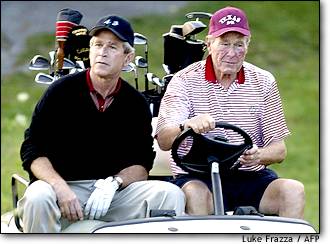The Aristocracy of Feelings
from The New CriterionAt what point in the history of the American republic, I wonder, did it become incumbent on its leaders to talk about their feelings in public — presumably as a way of signifying authenticity? In the New York Times last month we read that, in response to the news of a bomb that killed seven students, five of them Americans, in the Frank Sinatra Student Center of the Hebrew University in Jerusalem, “President Bush expressed his anger,” saying: “I am just as angry as Israel is. I am furious.” Not that he could have felt any other way. The next day, the report was amplified: “I’m furious that innocent life is lost. However, through my fury, even though I am mad, I still believe peace is possible.” No point in getting too angry — as angry as Israel is, say, where they increasingly believe that peace is not possible.
But was Israel angry? That he could take for granted, apparently, just as he could the motivations of the bombers, whom he described as “killers who hate the thought of peace and therefore are willing to take their hatred to all kinds of places, including a university.” Anger? Hate? No one supposed that the president had any special knowledge about the emotional lives either of Israeli victims or Arab terrorists, but he has clearly learned their parts in the international psycho-drama of war and peace, scripted by the media, as well as he has learned his own, which is to feel anger whenever there is another of these “senseless” bombings, and to let the world know about his anger.
It is one measure of the extent to which our politicians and diplomats, almost as much as our pundits and reporters, have accepted the psychological theory of international relations in terms of which war, and terrorism, are the result of overflowings of powerful emotions. The Arabs are angry with the Israelis for occupying what they regard as their land; the Israelis are angry with the Arabs for blowing them up in suicide terror-attacks. And once this assumption is made, it is natural to think of the solution as consisting of the search for ways to assuage that anger. If the Israelis could only compromise and give the Arabs some of the land they want, then their anger would be less — maybe even enough less to prevent them from perpetrating further suicide-bombings. That in turn would lessen Israeli anger, and so lead to further accommodations between the two sides.
But what if the problem is not emotional? To be sure, emotions are useful if you are nerving yourself to blow yourself up, or to throw rocks at people armed with automatic weapons. And those who have lost friends or family to terror-bombings may safely be assumed to feel anger about it, among other emotions. But to focus on those emotions is to mistake the consequence for the cause. The real reason for the acts of war committed by both sides is not an excess of emotion but the old imperatives of honor that our progressive and individualist culture has almost forgotten. A blow must be answered by a blow, whether or not you are angry (“don’t get mad; get even,” an American president is supposed to have said not so very long ago), or else you proclaim your weakness and invite further attacks.
This is what Western commentators are fond of describing as “the cycle of violence” — an easy thing to animadvert about if you are standing outside it. Yet to those who are caught up in it — whose numbers once included virtually the whole of the human race — generic “violence” doesn’t exist. There is only my violent act (good) and your violent act (bad). We forget how recent an innovation in human history, and how geographically limited to the fringes of Western Europe and North America, is the innovation in sensibility which regards the violent act not as an irreducible datum in the relationship between two people or nations but rather as a symptom of something else — some emotion which can be treated and calmed by measures short of committing the answering act of violence.
But the media culture is as usual shockingly uninterested in understanding or explaining other cultures than its own. In fact, the juxtaposition of “as usual” and “shockingly,” which sometime had been an oxymoron, is perhaps the media’s one undoubted contribution to the reform of consciousness. Instead, the media folk go blithely on assuming that all the world is as fascinated as they are with the process of observing feelings — for there is a sort of pornographic thrill in dragging into the public forum these essentially private phenomena — and pronouncing on their authenticity. Thus Elisabeth Bumiller of the Times proceeds to remark that “the president’s words were his most angry to date about the now-regular bloodshed in Israel and the occupied territories and reflected continuing frustration within the White House about how to stop the cycle of violence.”
Anger? Frustration? The president may not know “how to stop the cycle of violence,” but at least he can reassure us that he has the right kinds of feelings about it, and about the fact that, apparently, he can’t do anything about it. Of course, these feelings also include sympathy with the victims — “I’m particularly sad today because of American families who cry today and weep at the loss of a loved one” — or pride in the job that American or Israeli soldiers are doing in fighting the terrorists or any number of other feelings, and we can see the media checking them off and making sure that they are the appropriate feelings for the circumstances. But the existence of the feelings, and their sincerity, and not any action that might or might not arise out of them is what matters.
Bill Clinton understood this when he used to say: “I worked harder than I ever worked in my life. . .” to do something that he couldn’t or wouldn’t do, but that some people expected him to do. That was all right then. The main thing was that he wanted to do it. And it was partly because Al Gore never quite mastered the art of public feeling, or of making his feelings (such as they were) look genuine, that he failed to succeed his mentor. There has lately been a delicious postscript to the story of this incapacity in Gore’s quasi-confessional announcement to supporters that he was mistaken in 2000 in relying too much on the advice of pollsters and consultants and that he had resolved to “just let it rip” in any renewed assault on the political heights. This from a man who at one point during the campaign had eight different pollsters on his payroll! As Brent Bozell of the Media Research Center commented: “After working in an administration that paid untold millions of dollars to pollsters and consultants to package itself, Gore now blames the pollsters and consultants for their undue influence.”
Unlike his predecessor, President Bush at least seems to have a conscience about relying entirely on having the right feelings for our approval. That, I take it, is why he added that “even though I am mad, I still think peace is possible,” as he was about to begin a meeting at the White House with King Abdullah of Jordan. But King Abdullah too, in prospectively thwarting the presidential will (according to Ms Bumiller) to use Jordan as a staging ground for an invasion of Iraq, “just needs to know how I feel.” The king, like everybody else, must expect the president to tell us of his feelings, whether of anger or grief or pride or joy or sorrow or patriotism or gratitude or love, for that is how he lives up to his role not as president, who is constitutionally required to have no feelings at all, but as celebrity-in-chief.
Celebrities have always recognized that their status depends on the publishing of details of their ostensibly private and emotional lives, albeit in carefully controlled and scripted form; it is how they give us the assurance we require that they are real people, just like us, and so are deserving of their elevated status. Such revelations normally coincide with the release of a new movie or album, or the debut of a new televison series. Thus we learned this summer that the charming Jennifer Aniston, married to “Hollywood hunk” Brad Pitt and acting up a storm down at your neighborhood multiplex in The Good Girl, was (believe it or not) a sleep-walker! She woke up to find herself outside by the pool when the security alarm went off one night, she confided to US Weekly. “The alarm scared the s*** out of me,” she said — and out of the hunky Mr Pitt, who was “terrified because he heard the alarm, and I’m not there — it was just awful.”
No doubt it was awful too. But just as every cloud has a silver lining, so the awfulness was just awful enough, but not too awful, to make a story for US Weekly (and Reuters, which picked it up, and the Washington Post’s website, where I found it) that would confirm that the fetching somnambulist and star of TV’s “Friends” was the kind of star about which such star stories are written. Politicians and others who find themselves in the public gaze ex officio, as it were, and not on account of their personal adorability, may prefer to emphasize different emotions, but the feelings-test of personal and political authenticity that they must meet seems less and less distinguishable from that of other celebrities with each passing year.
It’s true that, more than most heads of state, the American president has always had something close to celebrity status, at least for so long as there have been celebrities. Maybe something similar happened in ancient times when the people and their rulers never lost eye-contact with one another. “Poor soul, his eyes are red as fire with weeping,” says one of Shakespeare’s plebeians in response to the funeral oration of Mark Antony — a man who could have taken Bill Clinton’s correspondence course. But in America it is only since the introduction of television into politics, that politicians have become the show-ponies of the feelings-circus. Perhaps we can hold Richard Nixon responsible, as we can for so many regrettable things in American political life, for his smarmy and mendacious performance as a “regular guy” in the Checkers speech, broadcast during the election campaign of 1952.
At least Nixon knew that he was putting on a performance. With today’s politicians, of both parties, we can’t help wondering if they ever had a genuine emotion, one not carefully shaped and molded and placed before the public for political purposes, in their lives. Are some miners rescued from a watery grave in Pennsylvania? The president is expected to go and express his satisfaction and admiration. Are some children kidnapped in California? The president is expected to show his concern (or possibly anger) by announcing a conference on the subject even if it is only, as Howard Kurtz of the Post says, “the kind of showy but shallow initiative that used to draw ridicule for the Clintonites.” Paradoxically, it is not necessary for the feeling itself to be genuine and spontaneous for it to stand as testimony to the genuineness and spontaneousness of the leader.
And do we want genuine emotion anyway? Maybe there is some residual good sense beneath all the glitter of the celebrity culture that tells us that we are really rather glad to think that the president’s anger has been scripted for him, just like his speeches, and so he is unlikely to do anything rash or foolish as a result of it. Could that have been the ironic subtext when Bush returned to the subject a few days later at the beginning of his vacation, announcing that he was “distressed to hear about the latest suicide bombers in Israel” just as he was about to step out onto the golf course of the Cape Arundel Golf Club in Maine? “There are a few killers who want to stop the peace process that we have started, and we must not let them,” he added, club in hand. “I call upon all nations to do everything they can to stop these terrorist killers. Thank you. Now watch this drive.”
According to the Washington Post reporter, “The abrupt segue illustrates the dilemma Bush will face over the next month as he relaxes and works at his ranch in Crawford, Tex., at a time of global political volatility.” Volatility, eh? Can we expect more “frustration” perhaps — or maybe even more “anger”— at all that “volatility”? But to one less schooled in the language of the great public psycho-drama brought to us each morning with our coffee, “the abrupt segue” might rather have suggested that the president faced no “dilemma” at all, hence no frustration and no anger either. He was playing golf as he always does in the summer, and if his “distress” was not going to interfere with his day on the links, it was unlikely to interfere with the performance of others of his presidential duties.
Of course it may be only that Bush, as Elisabeth Bumiller quotes Ken Raynor, the pro at Cape Arundel, as saying, “plays to relax and to forget the mounting pressures of his office” — which with a bit of a stretch would meet the feelings test of presidential competence. Stress could explain his brief lapse from feelings-decorum, and it might even elicit feelings of sympathy for himself. It certainly does from Mr. Raynor, the golf pro, who told the Times and Ms Bumiller that the president had “business at hand, and I can sense that. I feel for him.” Moreover, the golf-feelings seem to have got tied up with (naturally creditable) filial ones when the president called out to the press pack to applaud one of the drives of his father and predecessor in office, who made one of the foursome. “Let’s hear it,” he said, for the ovation would “Make the old boy feel better.”
Yet as Bush stepped to the tee (“hooking at first, but getting a solid shot the second time” as the reporter, Mike Allen, dutifully informs us), he may have had a purpose other than golf on his mind — which is why he also joked about how the Rangers had beaten the Red Sox the night before and “slouched in the golf cart and played the hot dog,” as Mr Allen reported, “steering and punching the accelerator from the passenger seat.” A week or so later he was at it again, this time at the Ridgewood Country Club in Waco, Texas, in reply to a reporter’s question about a possible war with Saddam Hussein’s Iraq. “The consultation process is a positive part of really allowing people to fully understand our deep concerns about this man, his regime and his desires to have weapons of mass destruction. Last question — and then I’ve got to go chip and putt for a birdie. [Laughter] It was a good drive.”
The incongruity between this kind of badinage and the ghastliness of the military and diplomatic deliberations which the press could hardly have failed to notice made a counterpoint to them might have suggested either cynicism or stupidity in the First Golfer. Were his boyish high spirits a slip that inadvertently revealed his true state of mind under the façade of appropriate feeling, or was he just too dumb to know what the appropriate feeling was without his script? Without ruling out either of these possibilities, I would like to think that there might be a third.
He might, that is, have wanted people to know that he knew he was acting a part in playing the media’s feelings game. He might have tipped the boys in the press pool a wink by way of saying that he was enough of an aristocrat himself not to be so impressed as they have to be with the aristocracy of feeling. This is the political philosophy of the journalistic culture: rule by those whose feelings are most creditable and authentic.
That’s why Lloyd Grove of the Washington Post found a juicy story in the fact that “Grieving relatives of American students killed in the July 31 bomb attack at Israel’s Hebrew University are upset that they haven’t heard from President Bush or anyone else at the White House.” And he quotes from a letter which one Stephen Benett, a cook from Charleston, South Carolina and cousin of one of the victims, sent to the president — a copy of which he thoughtfully forwarded to Mr. Grove. “I am writing you … to express how disappointed and frustrated I am with the way you … have handled this situation. My Aunt Linda, Uncle Michael and cousin Lisa Bennett are heartbroken. … There should have been some kind of communication of condolence from you, the president.” One reason why this was expected of him, said Mr Bennett, was that “”the nine miners who were trapped underground for 72 hours were rescued [and] a few days later you went to their celebration party. … My cousin was murdered and you didn’t even make a phone call or write a letter to her family.” Other relatives were said to feel the same. Two U.S. representatives are said to have expressed “outrage” at the president’s omission. Another relative compared his behavior with that of his predecessor, who “would not only have called the families, he probably would have shown up at the funerals.”
Ah, as Camille Chamoun, the former president of Lebanon, said of Dwight Eisenhower (who had sent 15,000 marines to put down a revolt in his country in 1958): C’etait un vrai président! If the chief task of the head of state is not actually to do anything but only to show that he shares fully and passionately in the sorrows and the joys of people in the news, Clinton may yet go down in history as our greatest president. But for that to happen, the one thing that must never be said, and yet that is unquestionably true, is that feelings, like elementary particles, can never be both public and authentic, can never be observed and at the same time distinguished from the processes of observation. As the business of journalism is increasingly the trafficking in these feelings, the journalist must never acknowledge that those feelings which are of absorbing interest to him are also elicited and shaped and made public in response to that interest. And yet the president may. Is that then what our president was doing in his horseplay on the golf course while people were suffering? One would like to think so.
Discover more from James Bowman
Subscribe to get the latest posts to your email.





